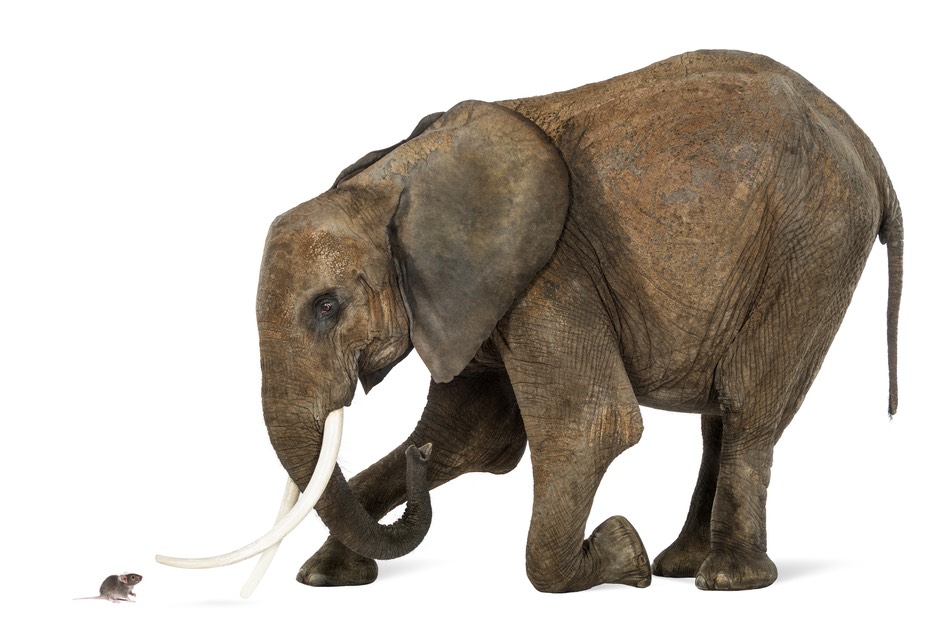Are Elephants Really Afraid of Mice?

From the movie "Dumbo" to Saturday morning cartoons, the image of an elephant cowering from a miniscule mouse is pretty well established. But the elephant's fear has more to do with the element of surprise than the mouse itself.
Theories abound that elephants are afraid of mice because the tiny creatures nibble on their feet or can climb up into their trunks. However, there's no evidence to back up either of those claims.
The mouse-in-the-trunk myth, for example, seems to date back centuries to the ancient Greeks, who reportedly told fables about a mouse that climbed into an elephant's trunk and drove it crazy. Some have said the claim started with Pliny the Elder in A.D. 77, as reported by Discovery's Myth Busters.
Apparently, in the late 1600s, an Irish physician named Allen Moulin was trying to figure out why such big pachyderms might quiver at the sight of such a small rodent as a mouse, according to Christopher Plumb's "The Georgian Menagerie: Exotic Animals in Eighteenth-Century London" (I. B. Tauris, 2015). Moulin reasoned that since elephants had no epiglottis — the flap of cartilage that covers the opening to the windpipe when swallowing — the big creatures could be "worried" that a mouse might crawl up their trunk and suffocate them, Plumb wrote. "This seemed reasonable since the keeper [Moulin] had seen his elephant sleep with his trunk close to the ground, so that only air might go up it," Plumb, who received his doctoral degree from the University of Manchester, wrote in the book. However, as biologists today know, elephants are equipped with that fleshy windpipe cover. (The elephant's epiglottis can be seen in a figure in this Journal of Experimental Biology paper.)
"I think the myth arose by the idea of the mouse crawling up the elephant's trunk and nostrils — but that is absurd because the elephant could easily simply blow and eject the mouse," said elephant expert Richard Lair, who has researched elephants for 30 years, published multiple studies on their behavior and is an international adviser to the Thai Elephant Conservation Center. "And that's in the very unlikely case that the mouse could [make it up the elephant's nostrils] anyway."
It's more likely that elephants, which have relatively poor eyesight, simply become startled when mice dart past. [Why Can't Elephants Jump?]
"In the wild, anything that suddenly runs or slithers by an elephant can spook it," said Josh Plotnik, a researcher of elephant behavior and intelligence at the University of Cambridge in England and the head of elephant research for the Golden Triangle Asian Elephant Foundation in Chiang Rai, Thailand, told Live Science. "It doesn't have to be a mouse — dogs, cats, snakes or any animal that makes sudden movements by an elephant's feet can startle it."
Get the world’s most fascinating discoveries delivered straight to your inbox.
John Hutchinson, a researcher at the structure and motion lab of the Royal Veterinary College in London, agreed: "Elephants get a bit nervous sometimes when small, fast animals are around them," he said. "I can remember one occasion when a local dog in Thailand was running around while we were working with an elephant for our locomotor studies. The elephant really did not like the barking, sprinting animal around it, especially when it couldn't see where the dog was. The elephant panicked, running off into the nearby jungle."
ABC's 20/20 conducted a test with trained elephants at Ringling Bros. and Barnum & Bailey Circus in 2006. A reporter and the circus elephant's trainer held mice in their hands and showed them to several elephants; apparently the elephants "only looked bored" and "not one of them seemed to care much." That may have been because the mice were held up for the elephants to clearly see in the reporter's and trainer's hands, instead of being set loose to race around the elephants' feet.
So rather than being afraid of the mouse itself, an elephant is most likely just surprised by its quick, frantic movements. "But the same is true for most animals," Plotnik said.
Editor's Note: This article was first published in 2011 and was updated in 2016.
Follow Live Science's Life's Little Mysteries @LLMysteries, Facebook & Google+.
 Live Science Plus
Live Science Plus






